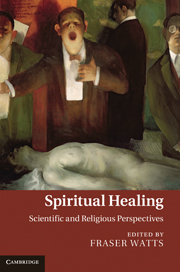Book contents
- Frontmatter
- Contents
- List of figures
- List of contributors
- Preface
- 1 Conceptual issues in spiritual healing
- 2 The historical Jesus and healing: Jesus' miracles in psychosocial context
- 3 The theology of spiritual healing
- 4 Healing the spirit: mystical Judaism, religious texts and medicine
- 5 Conceptualizations of spiritual healing: Christian and secular
- 6 The psychodynamics of spiritual healing and the power of mother kissing it better
- 7 Spiritual healing in the context of the human need for safeness, connectedness and warmth: a biopsychosocial approach
- 8 Modelling the biomedical role of spirituality through breast cancer research
- 9 Spirituality and health: assessing the evidence
- 10 Relating spiritual healing and science: some critical reflections
- 11 Concluding integration
- Bibliography
- Index
1 - Conceptual issues in spiritual healing
Published online by Cambridge University Press: 04 February 2011
- Frontmatter
- Contents
- List of figures
- List of contributors
- Preface
- 1 Conceptual issues in spiritual healing
- 2 The historical Jesus and healing: Jesus' miracles in psychosocial context
- 3 The theology of spiritual healing
- 4 Healing the spirit: mystical Judaism, religious texts and medicine
- 5 Conceptualizations of spiritual healing: Christian and secular
- 6 The psychodynamics of spiritual healing and the power of mother kissing it better
- 7 Spiritual healing in the context of the human need for safeness, connectedness and warmth: a biopsychosocial approach
- 8 Modelling the biomedical role of spirituality through breast cancer research
- 9 Spirituality and health: assessing the evidence
- 10 Relating spiritual healing and science: some critical reflections
- 11 Concluding integration
- Bibliography
- Index
Summary
Spiritual healing raises challenging issues. Religious traditions such as Christianity make strong claims about healing. The gospels are full of healing stories, and it is claimed that the followers of Jesus continued such healings. In the twentieth century and into the twenty-first there has been a marked revival of interest in healing within various faith traditions, and in non-religious settings too. Is it credible that spiritual healing takes place? If so, how are such healings to be understood and explained in our scientific culture?
First, though, there are really difficult problems of definition about spiritual healing. What do we mean by ‘spiritual’ healing? In considering this, it may be helpful to make a distinction between different things that ‘spiritual’ can be applied to in this context. There can be:
1 Healing in which spiritual practices play a role
2 Healing in which spiritual aspects of the human person are presumed to be involved
3 Healing that is explained in terms of what are presumed to be spiritual processes
I will consider each of these in turn. In doing so, it is important to remember that spiritual healing now occurs in both religious and non-religious settings. On the one hand, there is an explicitly Christian spiritual healing movement, most evident in charismatic churches, but also found in pilgrimages to Lourdes and other such sites. On the other hand, there is an explicitly secular spiritual healing movement, with links to ‘New Age’ culture.
- Type
- Chapter
- Information
- Spiritual HealingScientific and Religious Perspectives, pp. 1 - 16Publisher: Cambridge University PressPrint publication year: 2011



